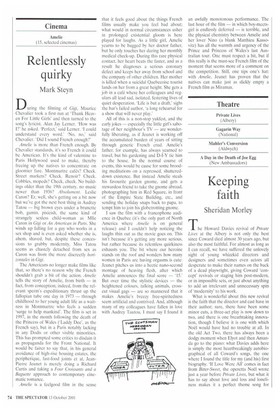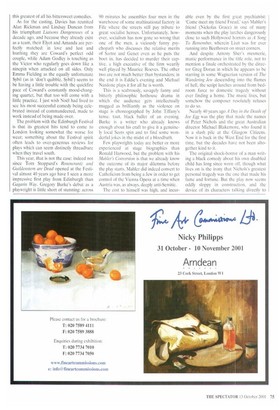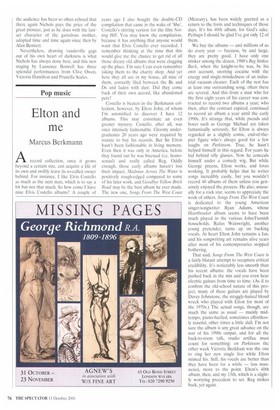Keeping faith
Sheridan Morley
The Howard Davies revival of Private Lives at the Albery is not only the best since Coward died almost 30 years ago, but also the most faithful. For almost as long as I can recall, we have suffered the unlovely sight of young whizzkid directors and designers and sometimes even actors all desperate to make their names on the back of a dead playwright, giving Coward 'concept' revivals or staging him post-modern, or in impossible sets, or just about anything to add an irrelevant and unnecessary spin of 'modernity' to his work.
What is wonderful about this new revival is the faith that the director and cast have in their author; sure, there have been some minor cuts, a three-act play is now down to two, and there is one breathtaking innovation, though I believe it is one with which Nod would have had no trouble at all. In the old Act Two, there has always been a dodgy moment when Elyot and then Amanda go to the piano: what Davies adds here is simply the most heartbreakingly autobiographical of all Coward's songs, the one where I found the title for my (and his) first biography. 'If Love Were All' comes in fact from Bitter-Sweet, the operetta Noel wrote just a year before Private Lives, but what it has to say about love and loss and loneliness makes it a perfect theme song for this greatest of all his bittersweet comedies.
As for the casting. Davies has reunited Alan Rickman and Lindsay Duncan from his triumphant Liaisons Dangereuses of a decade ago, and because they already exist as a team, their Elyot and Amanda are perfectly: matched: in love and lust and loathing they are Coward's perfect odd couple, while Adam Godley is touching as the Victor who regularly goes down like a ninepin when attacked on all sides. Only Emma Fielding as the equally unfortunate Sybil (as in 'don't quibble, Sybil') seems to be having a little trouble with the quickfire pace of Coward's constantly mood-changing quartet, but that too will come with a little practice. I just wish Noel had lived to see his most successful comedy being celebrated instead of commandeered, made to work instead of being made over.
The problem with the Edinburgh Festival is that its greatest hits tend to come to London looking somewhat the worse for wear; something about the Festival spirit often leads to over-generous reviews for plays which can seem distinctly threadbare when they travel south.
This year, that is not the case: indeed not since Tom Stoppard's Rosencrantz and Guildenstem are Dead opened at the Festival almost 40 years ago have I seen a more impressive first play from Edinburgh than Gagarin Way. Gregory Burke's debut as a playwright is little short of stunning: across 90 minutes he assembles four men in the warehouse of some multinational factory in Fife where the streets still pay tribute to great socialist heroes. Unfortunately, however, socialism has now gone so wrong that one of the men, a viciously funny psychopath who discusses the relative merits of Sartre and Genet even as he puts the boot in, has decided to murder their captive, a high executive of the firm wearily well played by Maurice Roeves. The other two are not much better than bystanders; in the end it is Eddie's evening and Michael Nardone plays it for all he is worth.
This is a scabrously, savagely funny and bitterly philosophic hothouse drama in which the audience gets intellectually mugged as brilliantly as the violence on stage is choreographed by John Tiffany's tense. taut, black ballet of an evening. Burke is a writer who already knows enough about his craft to give it a genuinely local Scots spin and to find some wonderful jokes in the midst of a bloodbath.
Few playwrights today are better or more experienced at stage biographies than Ronald Harwood, hut the problem with his Mahler's Conversion is that we already know the outcome of its major dilemma before the play starts, Mahler did indeed convert to Catholicism from being a Jew in order to get control of the Vienna Opera at a time when Austria was, as always, deeply anti-Semitic.
The cost to himself was high, and incur
able even by the first great psychiatrist: 'Come meet my friend Freud,' says Mahler's friend (Nickolas Grace) in one of many moments when the play lurches dangerously close to such Hollywood horrors as A Song To Remember, wherein Liszt was for ever running into Beethoven on street corners.
And despite Antony Sher's mesmeric, manic performance in the title role, not to mention a finale orchestrated by the director Greg Doran in which he appears to be starring in some Wagnerian version of The Wandering Jew descending into the flames of hell, the script lurches around from bedroom farce to domestic tragedy without ever finding a home. The music lives, but somehow the composer resolutely refuses to do so.
Nearly 40 years ago A Day in the Death of Joe Egg was the play that made the names of Peter Nichols and the great Australian director Michael Blakemore, who found it in a slush pile at the Glasgow Citizens. Now it is back in the West End for the first time, but the decades have not been altogether kind to it.
The original shock-horror of a man writing a black comedy about his own disabled child has long since worn off, though what lives on is the irony that Nichols's greatest personal tragedy was the one that made his fame and fortune. But the play now seems oddly sloppy in construction, and the device of its characters talking directly to the audience has been so often echoed that there again Nichols pays the price of the great pioneer, just as he does with the lastact character of the garrulous mother, adopted time and time again since then by Alan Bennett.
Nevertheless, drawing vaudeville gags out of his own heart of darkness is what Nichols has always done best, and this new staging by Laurence Boswell has three splendid performances from Clive Owen, Victoria Hamilton and PruneIla Scales.




























































































 Previous page
Previous page